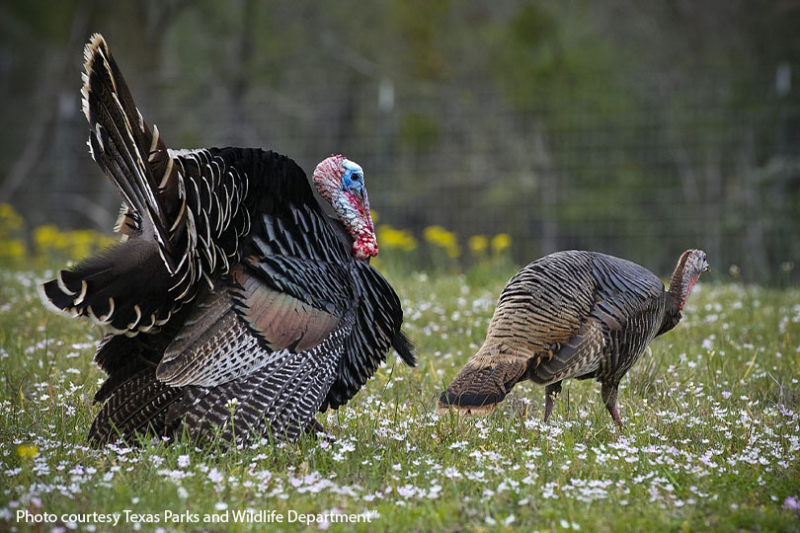By Jessica Domel
Multimedia Reporter
Texas turkey hunters may see a few regulation changes in the 2024-2025 hunting season.
In early November, Texas Parks and Wildlife Department (TPWD) staff previewed potential regulation changes for the Parks and Wildlife Commission.
“One thing we are going to propose is to remove subspecies from wild turkey regulations next year,” Shaun Oldenburger, TPWD small game program director, said. “The reason for this is people get really confused. Is that an Eastern? Is that a Rio Grande? We’re one of the few states that actually has subspecies tags. We’d rather just have seasons, annual bag limits and species regulations tied to counties not subspecies.”
TPWD is also considering closing the Eastern wild turkey season south of Highway 82 in Fannin, Lamar, Red River and Bowie counties.
“There are Eastern wild turkey stockings we’ve been doing in the Pineywoods and East Texas for a number of years now. We trap birds out of state. Last year, we got a bunch of birds of Maine. We flew those to Texas and released those to try to restore Eastern populations in the Pineywoods area,” Oldenburger said.
The department does not want to be in a “put and take” situation with these restocking efforts, Oldenburger explained.
“Our effort from the department standpoint is to actually restore wild turkeys to the Pineywoods of East Texas,” Oldenburger said. “We potentially could be proposing to close that area south of Highway 82 to the county line to help protect this restoration.”
To promote wild turkey restoration in parts of Central Texas, TPWD may also consider closing turkey hunting season in eastern Bell and Williamson counties and in all of Milam County.
“The last couple of years, the Army Corps of Engineers and surrounding landowners around Granger Lake have asked us to release some Rio Grande turkeys in that neighborhood,” Oldenburger said. “This is east of I-35. If anybody’s driven from DFW to San Antonio, you’ve seen a lot of changes in the last decade east of I-35 with a lot of increase in houses.”
I-35 has closed off the wild turkey population in those counties—leaving a good number of birds west of I-35, but few east of the interstate.
“We actually did have a meeting about this (in late October),” Oldenburger said. “We had about 40 individuals come, including landowners in the surrounding area, as well as hunters. The fair amount of consensus amongst those groups was to actually close Bell County and Williamson County east of I-35 and all of Milam County to turkey hunting for the next few years while we do a restoration process and release a bunch of Rio Grande turkeys in this landscape to see how well they actually do.”
Typically, closures like this would only last about five years. Then the department would go back, look at the species population, and determine if closures will continue or if the season will reopen.
To address turkey population declines, TPWD is also proposing regulation changes for portions of Bell, Comal, Guadalupe, Hays, Hill, McLennan, Travis and Williamson counties that lie north of I-10 and east of I-35 with an open season and four bird bag limit.
If approved, those areas would move to a spring-only season running from April 1-30 with a one gobbler bag limit and mandatory harvest reporting.
That will match current regulations with neighboring counties: Milam, Lee, Bastrop and Caldwell.
“There’s some good pockets of birds still in some areas in that location, but it’s getting more isolated as we speak,” Oldenburger said. “Right now, regulations are not very commensurate to population size. What we’ll probably be proposing to do is move that part of those counties to a one-gobbler zone.”
The proposal would also reduce the wild turkey hunting season length and annual bag limit in all counties with an open season west of the Pecos River.
“We currently have that as a four bird in the annual bag limit,” Oldenburger said. “There’s not many birds in this part of the world, especially since the drought going back to 2011 and 2012 and even more recent drought.”
TPWD is also considering mandatory harvest reporting in all counties.
“We don’t really get good data when it comes to measuring some of the things that we have as annual bag limits, for instance, like wild turkeys,” Oldenburger said. “We do have some mandatory reporting in one gobbler areas in the eastern area, but we have discussed expanding mandatory reporting through My Texas Hunt Harvest.”
Unlike other species, the turkey bag limit is an annual one. Those who hunt in a county with a four bird bag limit can take one in the fall and three in the spring, or any other combination that adds up to a maximum of four birds for the year.
Hunters in one gobbler areas now must already report their harvest via the My Texas Hunt Harvest app.
“A lot of people are getting used to mandatory reporting,” Oldenburger said. “Going to mandatory reporting, it will actually simplify things because then you don’t have to realize where you’re going to be for mandatory reporting. No matter where you are, if you harvest a wild turkey, we would require reporting.”
Receiving that information from hunters via the app would help the department as it continues to manage the species in Texas.
“Mandatory reporting in wild turkeys would also help us have immediate information,” Oldenburger said. “For instance, our small game harvest data gives us an estimate of the previous spring season about 18 months afterwards. We can’t really manage the species that well with regards to that harvest information.”
The proposed changes to turkey hunting regulations are informal until January.
In January, TPWD staff will submit formal proposals to the commission. If approved there, the proposals will be published in the Texas Register and a public comment period will open.
Then, TPWD will bring the proposed rule changes back to the commission in March seeking adoption.

